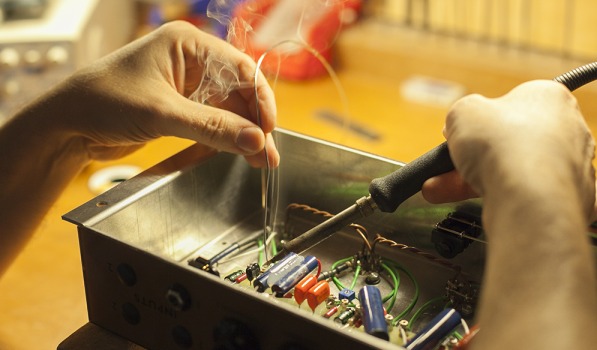On a cozy stretch of Morgan Ave., near several small neighborhood restaurants, Alphabasic Music Center stands inconspicuously, another small brick building with only the lettering on the window announcing its presence. For students, though, this non-profit music school started by Benn Jordan and Nissa Sampson is a staple of the Bridgeport neighborhood.
 Jordan, also know as The Flashbulb (his other pseudonyms include Acidwolf, Human Action Network, and FlexE) has a history of dizzyingly diverse music styles, from jazz to electronic and everything in between. He started his own non-profit record label, Alphabasic, in the ‘90s and has a career composing award-winning commercial music.
Jordan, also know as The Flashbulb (his other pseudonyms include Acidwolf, Human Action Network, and FlexE) has a history of dizzyingly diverse music styles, from jazz to electronic and everything in between. He started his own non-profit record label, Alphabasic, in the ‘90s and has a career composing award-winning commercial music.
Several of the contacts he’s made by dipping into the creative and business aspects of the music world are now resources for Alphabasic’s students, who range from beginners who are unsure of which instrument is right for them to proficient musicians hoping to improve their skills.
The center provides instruction for nearly any instrument a student can name, calling on freelance instructors to accommodate virtually any interest.
Jordan has an extensive collection of obscure musical paraphernalia himself, some of which he picks up on his travels. When asked the name of one vaguely guitar-resembling instrument, he confesses, “I have no idea. I’ve been trying to figure it out forever. I’m pretty sure it’s something that only exists in that Mexican desert area where I got it.”
For more basic lessons, though, students can turn to Samspon, the cello instructor, and piano instructor Kyle William. Coincidentally, both have a unique head of hair that children find memorable.
“People will be like, ‘I took lessons with the guy with hair,’” Sampson says, referencing William’s thick, curly locks, “and I’ll immediately know they mean Kyle. Then people call me and say, ‘My daughter wants to take lessons with the blue-haired girl.’”
Sampson is the resident string expert at the music center, specializing in cello. Though she still has other teaching gigs in the suburbs, she feels that the non-profit model of Alphabasic better allows her to meet her students’ needs.

“When I went into teaching, it was to help kids learn how to speak through their music, you know, and help them learn how to express themselves in ways that maybe they didn’t know how to otherwise,” Sampson says. “I try to make an opportunity for kids for whom this isn’t even something that they would consider, this isn’t even an option for them.”
In the process of putting together the music center, Jordan found that most schools grossly overprice their lessons, giving lower-class students a distinct disadvantage.
“When I was a kid, I never had music lessons, and when I think about it, no one in the neighborhood I grew up in would ever have music lessons for the prices that most schools charge,” Jordan says. “It’s something that’s almost always reserved for the upper class, and it’s not like the music teachers get paid well enough to justify that. It just seems like the profit margin is always really, really high.”
Due to a dissatisfaction with traditional schools, Jordan encouraged Sampson for nearly a year to start a school of her own.
While walking his dog, Lucy, around the Bridgeport neighborhood, he spotted a building that seemed like a good fit for their purposes. With the help of friends and the special brand of “help” that Lucy gave, which mainly involved dragging wet paint brushes along the floor, the two redecorated the space. Jordan also moved his recording equipment from his home to a back room of the music center.
Jordan will likely spend a good deal of his time at Alphabasic, but aside from a few workshops, he doesn’t plan to teach. For one thing, being both self-taught and a left hander using a right-handed guitar, he learned it “backwards,” not realizing until he was about six years in that many do not play that way. For another, Jordan admits to lacking that certain something that would allow him to teach. After all, being a great musician and a great instructor are two very different things.
“I’m by no means a good teacher, but Nissa and a lot of our friends are great teachers,” Jordan says.
Sampson and the other instructors at Alphabasic make a point of adding a student’s personal influences to a foundation of classical instruction.
“My personal teaching philosophy is that I want to teach what the student wants to learn, so if I have a student that comes in that says, ‘I want to learn Slayer on the cello,’ I’ll say, ‘Yeah, let’s do it,’” Sampson says. “You know, because there’s plenty of technique that can be learned from any genre of music. Whatever is going to inspire them is going to inspire me.”




